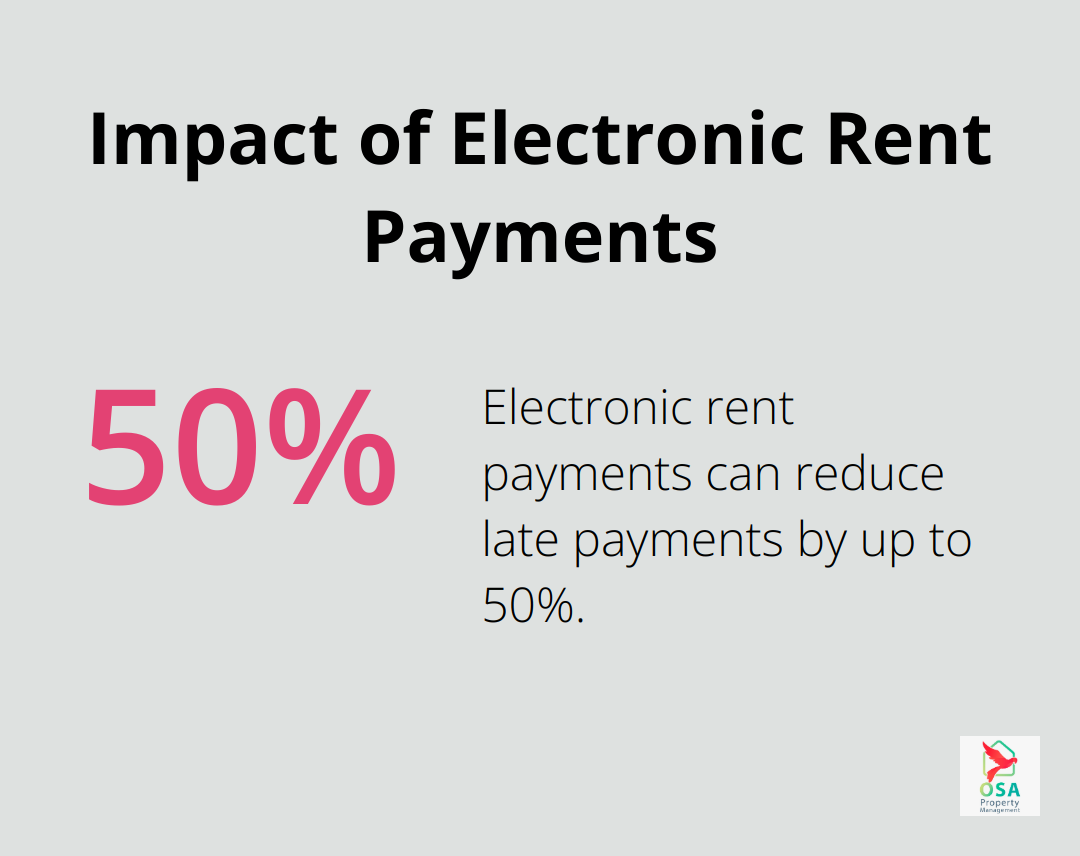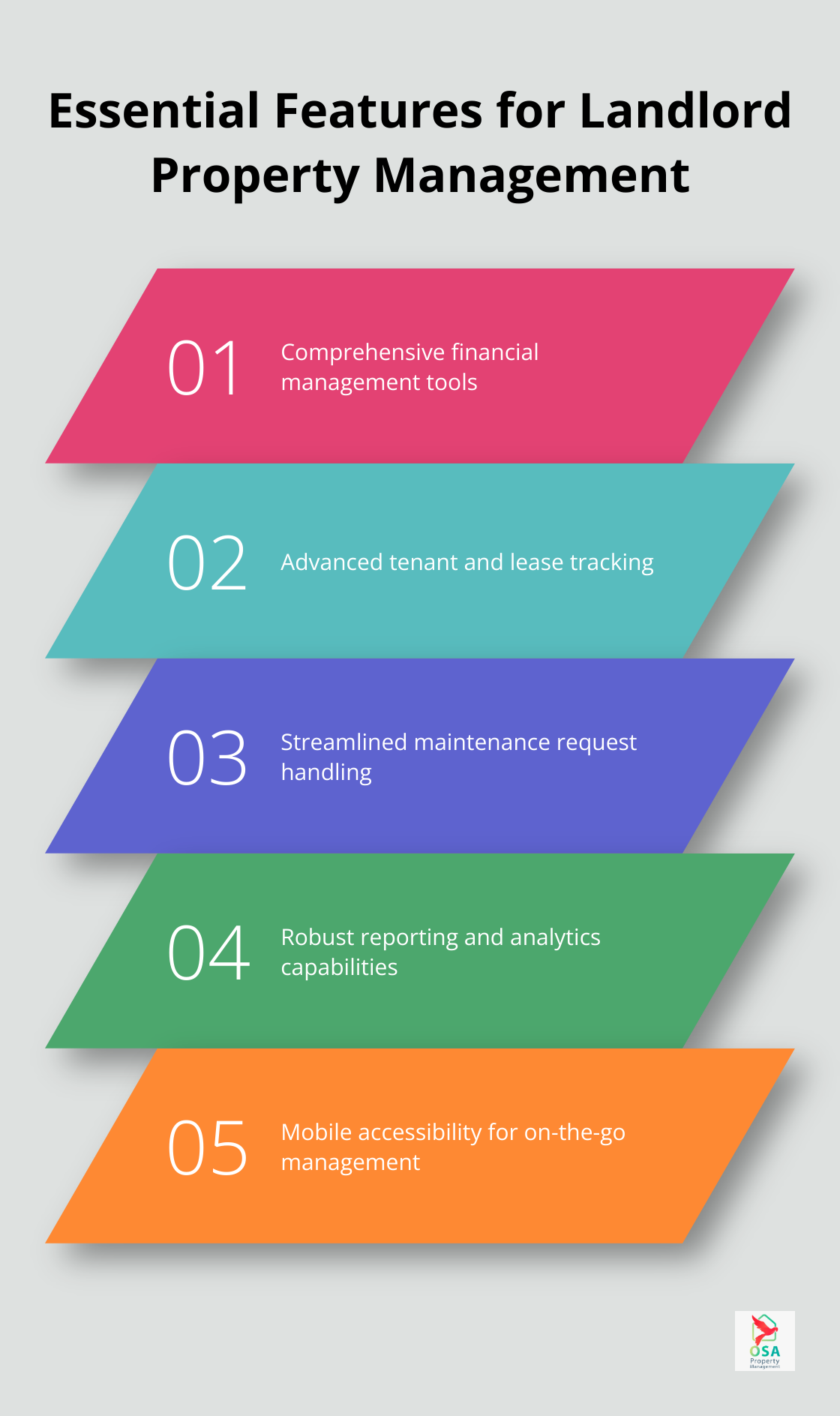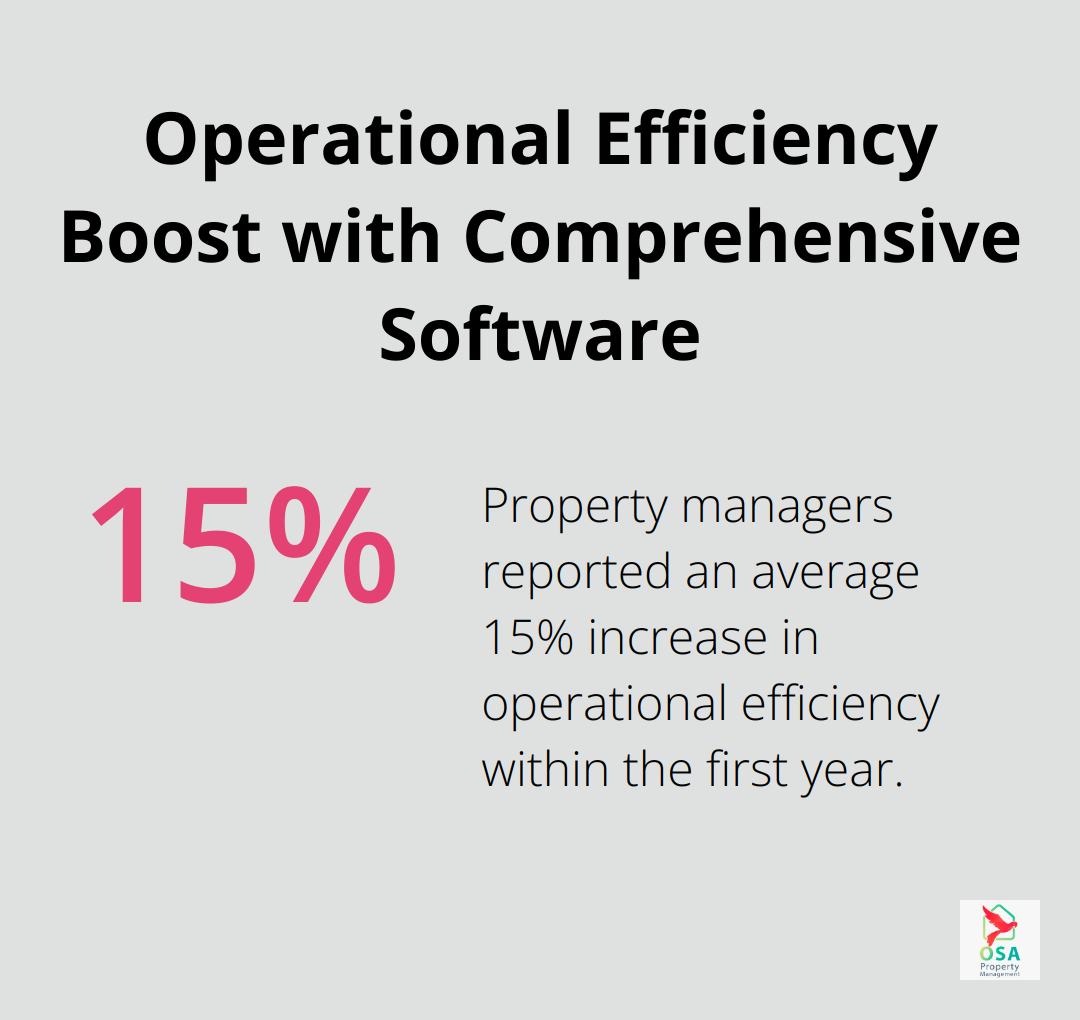At Osa Property Management, we know that choosing the right software can make or break your property management business. The best property management programs streamline operations, boost efficiency, and enhance tenant satisfaction.
This guide will help you navigate the complex world of property management software, focusing on key features, types of solutions, and crucial factors to consider during your selection process.
What Features Make Property Management Software Effective?
At Osa Property Management, we’ve witnessed how the right software can revolutionize property management operations. The most effective property management software combines several key features that optimize daily tasks and boost overall efficiency.
Robust Financial Management
A top-tier property management system must offer comprehensive financial tools. The best software automates rent collection, tracks expenses, and generates detailed financial reports. Property management software can help you make money on your rental property by providing must-have features and tools.
Online payment acceptance is essential. Software that enables electronic rent payments can slash late payments by up to 50% (according to PayLease). The ideal system should handle security deposits, create invoices, and manage vendor payments in one centralized platform.

Advanced Tenant and Lease Management
Effective property management software simplifies tenant and lease tracking. The best features allow easy storage and access to tenant information, including contact details, lease terms, and payment history. Automated lease renewal reminders can reduce vacancy rates and save time.
Tenant screening capabilities are vital. Software that integrates with credit reporting agencies and background check services helps you make quick, informed decisions about potential renters. Some advanced systems use AI to analyze applicant data and provide risk assessments.
Streamlined Maintenance Handling
Maintenance request management significantly impacts tenant satisfaction. The best software allows tenants to submit maintenance requests online and track their status. This transparency can reduce follow-up calls by 25% (AppFolio study).
Top systems automatically assign work orders to appropriate maintenance staff or contractors. The ability to attach photos and notes to maintenance requests improves communication and resolution times. Some advanced software uses predictive analytics to suggest preventative maintenance, potentially cutting emergency repairs by up to 20%.
Reporting and Analytics
Comprehensive reporting tools are essential for data-driven decision-making. Look for software that offers customizable reports on key performance indicators (KPIs) such as occupancy rates, rental income, and maintenance costs. The ability to generate real-time reports allows property managers to respond quickly to market changes and optimize their strategies.
Mobile Accessibility
In today’s fast-paced world, mobile accessibility is no longer a luxury-it’s a necessity. Property management software with robust mobile apps allows managers to handle tasks on-the-go, respond to tenant inquiries promptly, and access critical information from anywhere. This feature can significantly improve response times and overall efficiency.
As we move forward to evaluate different types of property management software, keep these key features in mind. The right combination of tools can transform your property management business, enhancing both efficiency and tenant satisfaction.
Which Property Management Software Type Fits Your Needs?
Cloud-based vs. On-premise Solutions
The choice between cloud-based and on-premise solutions impacts how you access and manage your property data. Cloud-based software allows access from any internet-connected device, ideal for on-the-go management. One advantage of using cloud-based property management software is flexibility – it can be customized to meet specific business needs and scale up or down as required.
On-premise solutions offer greater control over data and suit businesses with strict security requirements. However, these typically require higher upfront costs and ongoing maintenance.
Comprehensive Platforms vs. Specialized Tools
All-in-one property management platforms provide a wide range of features, from tenant screening to financial reporting. These solutions streamline operations into a single tool. As of March 20, 2025, the best platforms offer 10 essential features that are crucial for effective landlord property management.

Specialized tools focus on specific aspects of property management (such as accounting or maintenance tracking). These tools excel in their niche and suit businesses with unique needs in certain areas.
Integration Capabilities
The ability to integrate with other business systems proves essential for any property management software. Look for options that connect seamlessly with your existing tools, like accounting software or CRM systems.
When evaluating integrations, consider both quantity and quality. Some software offers superficial connections, while others provide deep, two-way data syncing.
Mobile Accessibility
In today’s fast-paced world, mobile access to property management tools is no longer optional. Software with robust mobile apps allows managers to handle tasks, respond to inquiries, and access critical information from anywhere. This feature significantly improves response times and overall efficiency.
Scalability and Customization
As your property portfolio grows, your software needs may change. Choose a solution that scales with your business and offers customization options. This flexibility ensures the software continues to meet your needs as your business evolves.
The right property management software type depends on your specific needs, budget, and growth plans. Take time to evaluate your options thoroughly. Request demos or free trials to test different solutions. The next section will explore key factors to consider when making your final selection.
What Factors Matter Most When Choosing Property Management Software?
Portfolio Size and Complexity
The size and type of your property portfolio influence your software needs. Smaller portfolios (1-10 units) often require simpler solutions. Larger portfolios demand more robust features to handle increased complexity.
Yardi offers two innovative platforms designed for real estate management: Yardi Voyager and Yardi Breeze. Both include accounting, operations and ancillary features to handle various portfolio sizes and complexities.
Cost vs. Value
Budget matters, but don’t focus solely on price. Consider the long-term value and potential return on investment. Higher-priced solutions often offer features that save significant time and money over time.
Many software providers offer tiered pricing based on the number of units managed. This model allows you to start small and scale up as needed. Watch out for hidden fees for features like online payments or additional users.
A recent survey found that property managers who invested in comprehensive software solutions reported an average 15% increase in operational efficiency within the first year.

Ease of Use and Implementation
The most feature-rich software becomes useless if your team can’t or won’t use it effectively. Look for intuitive interfaces and logical workflows. Take advantage of free trials or demos to assess user-friendliness firsthand.
The implementation process matters too. Some solutions require extensive setup and data migration, while others offer streamlined onboarding. Factor in the time and resources needed for a smooth transition.
Support and Training Resources
Even the most user-friendly software requires support and training. Evaluate the quality and availability of customer support. Look for providers that offer multiple support channels (phone, email, chat) and extended hours.
Comprehensive training resources prove equally important. Video tutorials, knowledge bases, and regular webinars can significantly reduce the learning curve for your team. Some providers offer personalized onboarding and ongoing training to ensure you maximize the software’s potential.
Scalability and Future-Proofing
Your chosen software should grow with your business. Assess the scalability of each solution – can it handle an increase in properties or users without a significant price jump or performance issues?
Consider the provider’s track record of updates and innovations. The property management landscape evolves constantly, and your software should keep pace. Look for providers that regularly introduce new features and integrate emerging technologies.
While marketing materials can be impressive, real-world performance matters most. When evaluating property management software, look for client testimonials and reviews on trusted platforms to get a more accurate picture of the solution’s effectiveness.
Final Thoughts
Selecting the best property management programs will significantly impact your business’s efficiency and success. The ideal software should align with your specific needs, portfolio size, and future growth plans. We recommend you prioritize robust financial management tools, advanced tenant tracking, streamlined maintenance handling, and comprehensive reporting capabilities.
User-friendliness, implementation process, support resources, and scalability contribute to the long-term value of your chosen solution. We suggest you take advantage of free trials and demos to get hands-on experience with different software options. At Osa Property Management, we understand the importance of efficient property management in Costa Rica.
You should thoroughly assess your needs, research different options, and consult with your team. The best property management software for your business will meet your current needs and support your future growth. It will also adapt to the evolving landscape of property management (which changes rapidly in today’s digital age).

